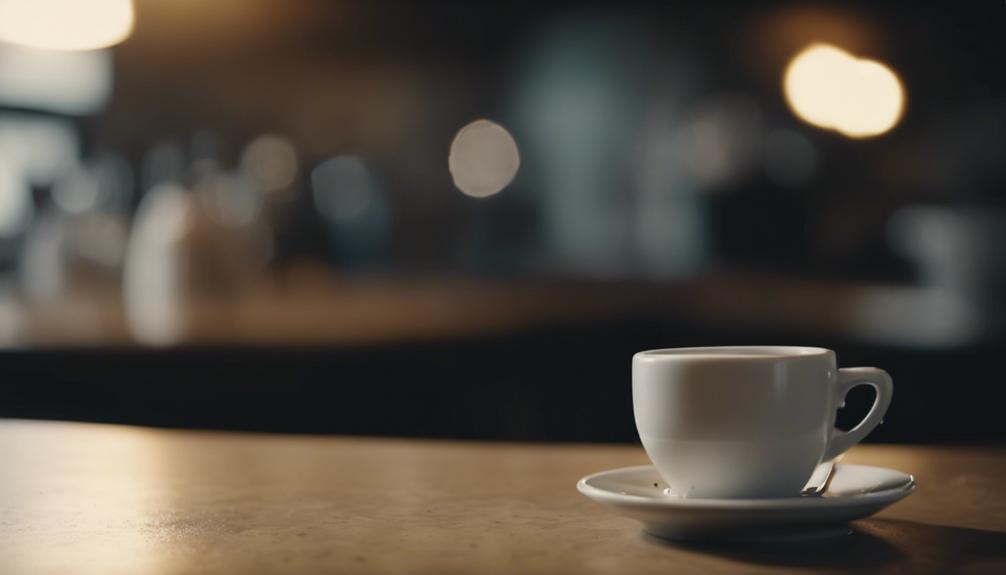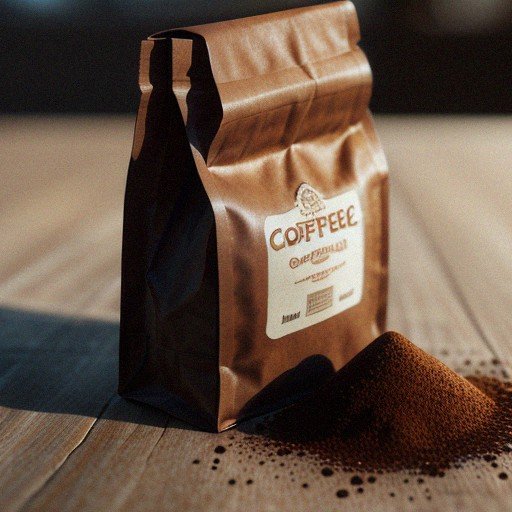Is Black Coffee Safe to Sit Out Long?

As a coffee lover, I've often wondered about the safety of leaving black coffee out for extended periods. It's surprising how a simple beverage can become a breeding ground for potential health hazards if not handled properly. The question of whether black coffee is safe to sit out long has implications beyond just taste. Join me as we explore the risks associated with aged coffee and why it's important to think about proper storage methods to avoid any unwanted consequences.
Potential Health Risks of Aged Coffee
Aged coffee poses significant health risks due to potential mold growth and bacterial contamination if left out for an extended period. When coffee is left to sit for too long, especially when brewed, it becomes a breeding ground for mold and bacteria.
Mold growth on aged coffee can occur after about a week, escalating quickly and potentially leading to foodborne illnesses if consumed. Consuming spoiled coffee with visible mold can result in stomach discomfort and digestive issues, making it important to discard any aged coffee showing signs of spoilage.
Bacterial contamination is another concern when it comes to aged coffee. Extended storage of brewed coffee increases the chances of harmful bacteria multiplying, further heightening health risks. To safeguard against these dangers, it's advisable to avoid leaving coffee out for prolonged periods and to promptly discard any coffee that has been sitting for too long.
Mold and Bacteria Growth Concerns
How quickly can mold and bacteria grow on black coffee left out at room temperature?
Mold can start developing on black coffee that has been left out at room temperature after approximately 7 days. Bacteria multiply rapidly in warm environments, potentially leading to foodborne illnesses if the coffee is consumed.
Proper storage and refrigeration are vital in preventing mold and bacteria growth in black coffee. Failing to refrigerate coffee promptly can pose health risks due to the growth of harmful microorganisms.
It's essential to discard any black coffee that has been sitting out for an extended period to avoid the hazards associated with moldy coffee. By taking these precautions and being mindful of coffee storage, you can guarantee that your beverage remains safe for consumption and free from the risks of mold and bacterial contamination.
Refrigeration for Coffee Preservation

Refrigerating black coffee is essential for maintaining its freshness and flavor, especially when left out for an extended period.
Cold temperatures help slow down the oxidation process, preserving the quality of the coffee.
Storing black coffee in the refrigerator not only prevents rapid bacterial growth but also guarantees its safety and enjoyment within a 24-hour window.
Room Temperature Coffee
Refrigeration is vital for preserving the quality and freshness of black coffee that has been left out at room temperature. When black coffee is left out at room temperature, it should be refrigerated within 1-2 hours to maintain its flavor and aroma.
Storing black coffee in the refrigerator can extend its shelf life for up to a week, compared to leaving it at room temperature where its taste and freshness can decline rapidly. Prompt refrigeration is essential to prevent bacterial growth and safeguard the safety of black coffee that has been left out.
Impact of Heat
When exposed to heat, black coffee undergoes accelerated oxidation, hastening the degradation of its flavor profile. This oxidation process occurs more rapidly when black coffee is subjected to higher temperatures, impacting its taste and aroma.
Heat exposure can greatly shorten the shelf life of black coffee, causing it to go stale quicker than if stored properly. Refrigeration plays an important role in preserving the freshness of black coffee, extending its shelf life by reducing the speed of oxidation.
Spoilage Prevention
After understanding the impact of heat on black coffee's flavor profile, it becomes apparent that proper preservation through refrigeration is essential for maintaining its freshness and quality over extended periods.
Refrigerating black coffee helps preserve its freshness and quality for up to 24 hours. Storing it in the refrigerator slows down the degradation process caused by exposure to air and light, inhibiting bacterial growth and potential foodborne illnesses.
Airtight containers are ideal for storing black coffee in the refrigerator as they maintain its flavor and aroma for longer periods.
Proper refrigeration is vital to prevent spoilage and guarantee the safety of black coffee left out for extended periods.
Safety Guidelines for Aged Coffee

When it comes to aged coffee, it's important to follow safety guidelines to prevent potential health risks and maintain freshness. Proper storage tips and shelf life recommendations play a significant role in ensuring the quality of aged coffee.
Coffee Storage Tips
Proper storage of aged black coffee is essential to maintain its safety and quality over time. To prevent rancid taste and mold growth, black coffee shouldn't be left out at room temperature for more than 1 to 2 hours.
Storing aged coffee in the refrigerator can extend its shelf life to about a week, helping to preserve its freshness. Prolonged exposure to air and light can lead to flavor deterioration and potential health risks.
Following proper storage guidelines is vital to avoid bacterial contamination and mold formation in aged black coffee. By adhering to these practices, you can ensure that your coffee remains safe for consumption and maintains its peak taste profile.
Shelf Life Recommendations
To guarantee the safety and quality of aged coffee, it's essential to follow specific shelf life recommendations and safety guidelines.
- Refrigerate: Storing black coffee in the refrigerator can help prolong its freshness and prevent bacterial contamination.
- Avoid room temperature: Black coffee shouldn't sit out for more than 30 minutes at room temperature to maintain its best flavor profile.
- Watch for staleness: Aged coffee can become stale, losing its aromatic compounds and developing a rancid taste over time.
- Quality control: Consuming black coffee that has been sitting out for too long may result in a bitter taste and an unpleasant drinking experience.
Risks of Consuming Aged Coffee
Consuming aged coffee exposes individuals to potential health risks associated with mold growth and bacterial contamination. As black coffee ages, the oxidation of oils and compounds can lead to a bitter or acidic taste, making it develop a stale or off-putting flavor. While aged coffee mightn't present immediate health dangers, prolonged consumption increases the likelihood of mold and bacteria forming in the coffee, which can be harmful if ingested.
The preference for additives such as milk or sugar can also affect the overall quality and taste of aged coffee. To guarantee a top-notch coffee-drinking experience, it's advisable to prioritize freshly brewed black coffee over aged varieties. By opting for freshly brewed coffee, you can evade the risks associated with consuming aged coffee, safeguarding your health and enjoying a more flavorful cup of joe.
Effects of Long-term Coffee Exposure

Extended exposure to black coffee can lead to degradation in flavor and potential bacterial contamination. When coffee sits out for a prolonged period, several negative effects can occur:
- Loss of Flavor: Extended exposure to air can cause black coffee to taste stale and lose its aromatic compounds.
- Unpleasant Taste: Leaving black coffee out for too long can result in a rancid taste, bitterness, and overall unpleasant drinking experience.
- Flat Flavor Profile: Stale black coffee may have a flat flavor profile, diminishing the enjoyment of the drink.
- Safety Concerns: Stale coffee could potentially upset the stomach if consumed, leading to discomfort and digestive issues.
It is important to be mindful of how long coffee sits out to safeguard both taste and safety. Discarding black coffee that has been exposed for an extended period is advisable to avoid these negative consequences.
Black Coffee Shelf Life Considerations
Considering the factors influencing black coffee's shelf life, it's essential to understand how storage conditions and exposure affect its quality over time. Black coffee, when left at room temperature, starts to degrade in flavor after about 30 minutes. Beyond 24 hours, it becomes unsafe due to potential bacterial contamination.
If milk or creamer is added, it's best to discard the coffee within 1-2 hours to prevent spoilage. Storing black coffee in the refrigerator can prolong its shelf life to approximately a week. The duration black coffee remains drinkable varies based on how it's brewed, the pot it's stored in, and environmental factors like air and heat exposure.
Cold black coffee is still safe to drink if refrigerated promptly, but its quality will deteriorate over time. To enjoy a fresh cup, brew only what you intend to drink immediately or store it properly for later consumption.
Preventing Health Hazards From Aged Coffee

Mold growth and bacterial contamination are significant health hazards that can arise from consuming aged coffee. To prevent health risks associated with aged coffee, proper storage and timely consumption are essential. Here are some key points to bear in mind:
- Mold growth on aged coffee can lead to potential health hazards if consumed.
- Leaving black coffee out for an extended period can result in bacterial contamination.
- Stale black coffee may pose risks of upset stomach or foodborne illnesses.
- Discarding black coffee after recommended timeframes can help avoid health risks associated with aged coffee.
Ensuring that coffee is stored in airtight containers, away from moisture and sunlight, can help inhibit mold growth and bacterial contamination. Additionally, consuming coffee within a reasonable timeframe of brewing can minimize the chances of health hazards. If coffee has been left out for too long or shows signs of spoilage, it's best to err on the side of caution and discard it to protect your health.
Conclusion
In essence, it's essential to refrigerate black coffee promptly to prevent mold and bacterial contamination. Neglecting to store coffee properly can lead to foodborne illnesses and health risks.
By following safety guidelines and being mindful of the shelf life of black coffee, you can enjoy your favorite beverage without compromising your well-being. Remember, when it comes to coffee, freshness and proper storage are key to ensuring a safe and enjoyable drinking experience.





